Brannavan Gnanalingam on… how the past can enlighten our future
Sri Lankan novelist, Anuk Arudpragasam’s novel, A Passage North was recently shortlisted for the Booker Prize. The protagonist in the book, Krishan, journeys from Colombo to the war-ravaged north of Sri Lanka, as he attends the cremation of his grandmother’s carer, Rani.
The novel comprises very long, flowing sentences – in which time, space, and memory become elusive. One thing that was particularly confronting was the way in which Arudpragasam uses distance. There is the obvious geographical distance between a war zone and the protagonists’ middle-class life in Colombo.
The biggest distance however existed between the characters’ experiences of the Civil War. Krishan’s somewhat academic response to the Civil War, and Rani’s direct experience of the horror, were almost irreconcilable. Krishan, despite his openness, was unable to truly comprehend what Rani had gone through. Without that direct experience, you can never really understand. And worse, like Krishan, you can simply turn off the television, or go home, elsewhere, once the journey is complete.
In direct contrast to the distance provided by A Passage North, I also recently read a couple of the 20th century’s most extraordinary accounts of horror. Jewish-Italian writer, Primo Levi’s If This Is a Man was a calm, devastating account of Levi’s incarceration in Auschwitz. In it, Levi sets out his observations on how people around him responded to the horror of the concentration camp, while also recounting the sheer luck that meant he survived whereas so many millions didn’t. He also, with utter precision, recounts the sheer destruction of the human spirit by the Nazis.
Levi wrote the memoir in the immediate aftermath of World War II, with his memories collected on train tickets and scraps of papers. He wrote with a moral imperative: that you must remember, bear witness, and make others remember that which they have not experienced. The book had little success upon its immediate release (its reputation taking some time to build), but it is clearly one of the most important books of the 20th century.
Similarly, Leningrad Under Siege by Ales Adamovich and Daniil Granin recounts the first year of the horrendous German/Finnish siege of Leningrad during the World War II. The historians edit (primarily) three ordinary citizens’ diaries, in which we see the growing starvation from the blockade, and the effects of a brutal winter. The siege lasted nearly three years, and it’s believed more than one million Leningrad civilians died in it. The food situation was so dire, that bread was largely made up of sawdust, and people resorted to eating wallpaper (due to the paste being made from potato starch), leather, pets, and dead bodies.
Adamovich was similarly of the view of the importance of testimony, and trying to capture voices in an unmediated state. Film buffs may recognize the name, as he wrote the astonishing Soviet war film, Come and See. He also became the mentor to one of my favourite writers, the Nobel Prize-winning Belarusian writer, Svetlana Alexievich. She creates astonishing oral histories of traumatic historical events such as Chernobyl (the basis for the television show), the Soviet invasion of Afghanistan and the World War II. Her first-hand accounts of historical events are must-reads.
History has always been a contested site. We know, for example, that the groundwork for totalitarian regimes comes from a misuse of history – politicians who evoke some glorious past (which never existed), and who then say, if you trust me, I’ll bring back that past. It’s easy to smooth out the complexity of history in favour of slogans and scapegoating.
You can see the distance evoked by Arudpragasam play out in a number of areas. The distance helps folk misuse history. This is evident in the spurious debates on what gets taught (and doesn’t get taught) in schools around the world – as if the past is too hard for our kids to learn about. Watching the anti-vaxx protest in Wellington the other day made me think, “you may have genuine concerns about getting vaccinated, but you’re also marching with people brandishing swastikas and Holocaust symbols.” It’s grifters co-opting the signs of the past to create a false sense of victimhood and/or simply, and cynically, use them to get some attention.
It can be confronting to examine the past. I could not help but feel a staggering sense of loss while reading the three books, and in particular when faced with the testimony of voices that are now long gone. A lot of it is ugly and heart-breaking. But it’s necessary. Otherwise, it becomes all too easy to ignore the continuing repercussions of the past on the structures of today. All that happens is we end up listening to those who show no interest in listening to anyone else.
– Brannavan Gnanalingam is a Sri Lankan born New Zealand author, who is also a practicing lawyer. This article was originally featured on stuff.co.nz


